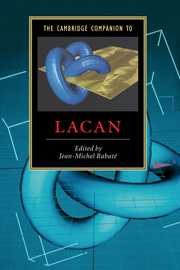Book contents
- Frontmatter
- 1 Lacan’s turn to Freud
- 2 The mirror stage: an obliterated archive
- 3 Lacan’s myths
- 4 Lacan’s science of the subject: between linguistics and topology
- 5 From the letter to the matheme: Lacan’s scientific methods
- 6 The paradoxes of the symptom in psychoanalysis
- 7 Desire and jouissance in the teachings of Lacan
- 8 Lacan and philosophy
- 9 Lacan’s Marxism, Marxism’s Lacan (from Žižek to Althusser)
- 10 Ethics and tragedy in Lacan
- 11 A Lacanian approach to the logic of perversion
- 12 What is a Lacanian clinic?
- 13 Beyond the phallus: Lacan and feminism
- 14 Lacan and queer theory
- 15 Lacan’s afterlife: Jacques Lacan meets Andy Warhol
- Further reading
- Index
- Series List
3 - Lacan’s myths
Published online by Cambridge University Press: 28 May 2006
- Frontmatter
- 1 Lacan’s turn to Freud
- 2 The mirror stage: an obliterated archive
- 3 Lacan’s myths
- 4 Lacan’s science of the subject: between linguistics and topology
- 5 From the letter to the matheme: Lacan’s scientific methods
- 6 The paradoxes of the symptom in psychoanalysis
- 7 Desire and jouissance in the teachings of Lacan
- 8 Lacan and philosophy
- 9 Lacan’s Marxism, Marxism’s Lacan (from Žižek to Althusser)
- 10 Ethics and tragedy in Lacan
- 11 A Lacanian approach to the logic of perversion
- 12 What is a Lacanian clinic?
- 13 Beyond the phallus: Lacan and feminism
- 14 Lacan and queer theory
- 15 Lacan’s afterlife: Jacques Lacan meets Andy Warhol
- Further reading
- Index
- Series List
Summary
Freud's work has been both praised and maligned for its frequent introduction of myths and narratives which attempt to map out the archaeology of the human psyche. These range from classical myth to the invention of new myths, from the use of the Sophoclean Oedipus to the strange story about the origin of society set out in Totem and Taboo. Critics of Freud have pointed out the limitations of these models, their historical contingency, and the implausibility of their claims in terms of evidence taken from other fields in the human sciences. As historical narratives, their weaknesses are taken as impeachments of Freudian theory as a whole. Hence the psychological theories of the Oedipus complex or the castration complex become, in their turn, mere myths, fictions that collapse once their historical underpinnings undergo scrutiny.
Even to those sympathetic to psychoanalysis, many of Freud’s narratives seem quaint and far-fetched, and yet, as the recently published text on the importance of the ice age for human development makes clear, such apparent flights of fancy formed an integral part of Freud’s procedure. A search for origins was characteristic of much early twentieth century thought, as it had been in the Enlightenment, and Freud’s commitment to a form of phylogeny was shared by many other Continental thinkers. While this is not the place to go into the details of Freud’s use of classical myth and mythic constructions, we can ask whether Lacan’s methods of exposition have anything in common with Freud’s.
- Type
- Chapter
- Information
- The Cambridge Companion to Lacan , pp. 35 - 49Publisher: Cambridge University PressPrint publication year: 2003
- 12
- Cited by



